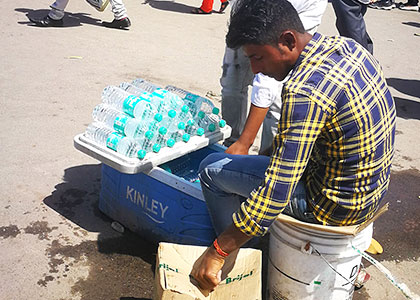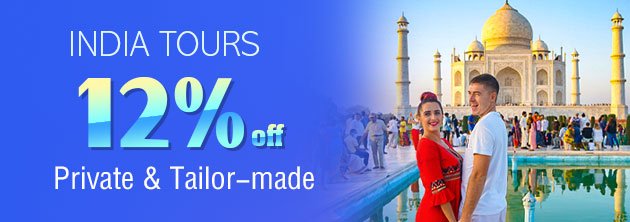Hygiene in India: 6 Tips to Stay Healthy on Your India Travel
India is an interesting country with a dynamic landscape and stunning experiences. However, to enjoy the best of India, you have to stay healthy and fit. Hygiene in India is a big question for overseas tourists, who sometimes catch bad cases of dysentery and diarrhea. Pollution, lack of clean drinking water, and other issues could make India trip overwhelming for a few.
But, contrary to popular notion, you can stay healthy on your trip to India. Remember to follow certain precautions, eat at places where locals congregate, and always drink water from a reliable source. Ideally, you have to take preventive measures before putting a foot on the Indian soil, to stay away from healthy.
A little bit of planning can take you a long way on your India tour. Here are six helpful tips that make sure you have a comfortable and safe stay in India, without any interruptions by diseases.
1. Get your vaccines and booster shots
Vaccination is important for a disease-free trip to India. According to the Center of Disease Control (CDC), Typhoid is one of the most commonly reported diseases among the tourists followed by dysentery and diarrhea – primarily due to the presence of contaminated water. The institution points out that, many of the diseases can be prevented by staying up-to-date with vaccination and booster shots.
According to the CDC, vaccination for the following diseases are recommended for traveling to the country:
• Meningococcal• MMR
• Polio
• Japanese Encephalitis
• Tetanus-Diphtheria
• Hepatitis A and B
• Rabies
• Typhoid
Visit your doctor before heading towards India, and get an updated list of recommended vaccinations for your safety.
Read More: Must-take Vaccinations
2. Stock safe drinking water, and go for bottled ones
The availability of safe drinking water becomes a big question for tourists. Due to the lack of safe drinking water, many international visitors suffer from water-borne diseases like Cholera and Dysentery. Always look out for safe sources of water, and stock up if found. The government-sponsored drinking water booths, an initiative to maintain hygiene in India, offer drinkable water. You can also opt for bottled water, as they are safer to use.

Drink Bottled and Sealed Water
|
Pro tip:
• Drink plenty of water in India to avoid the risks of dehydration• Keep away from the ice
• Avoid from accidentally sipping shower water or tap water
• Water bottles with broken seal must be avoided at any cost
• Tea and coffee are made from boiling water, and so are safe to drink
Taking precautions against water can protect you against several severe diseases.
Read More: Health-wise Tips for Drinking Water
3. Wash your hands regularly
Washing hands is important for maintaining hygiene in India. As infectious diseases can spread from person to person through contaminated hands, you must wash your hands frequently. Also, remember to clean your hands thoroughly.
Times when you should wash your hands:• After using the toilet
• Before and after eating
• Before handling food
• After smoking
• Prior to or after attending sick children
Essentials to carry in your travel bag
• Good hand sanitizer
• Surface sanitizer for cutlery
• Paper soap strips
• Clean water
Also use your surface sanitizer to decontaminate your laptops, cell phone, and wallets.
4. Eat peeled food with caution
In India, most fruits and vegetables are washed with contaminated water - making them a hub of water-borne diseases. Some high-end establishments and restaurants prepare food keeping in mind the need of Western travelers. In general, keep some amount of caution before eating raw food.
If you want to try the exotic Indian fruits and vegetables, try buying them directly from the market. You can wash them at your hotel and eat them with a piece of mind. Also, instead of buying fruits off the streets, visit the local supermarkets for buying vegetables.
Also, locals can direct you towards suitable fruit and vegetable vendors selling organic items.
5. Take probiotics
The hot climate of India can be a bit overwhelming for the digestive system of international tourists. Probiotic bacteria can help in digestion and are effective in preventing cases of Delhi Belly (dysentery and diarrhea). Start taking them a month early before your trip, and carry traveler kits for your India tour. Available in traveler-friendly containers, these drinks do not require refrigeration.
But, these travel kits can be a bit bulky. Instead, you can go for the following Indian substitutes that are rich in probiotic bacteria:• Fresh yogurt found in sealed packets
• Cottage cheese
• Buttermilk
Clean and simple eating habits, coupled with a dose of probiotics can keep the stomach happy. International tourists are not exposed to a huge variety of bacteria from food sources. A probiotic is a healthy way of introducing a mixture of bacteria – without shocking digestion.
6. Carry necessary medicines
In India, you can get common over the counter medicines for common diseases to keep Hygiene in India. But carrying essential medicines, while traveling, can save you a lot of headaches - if you are suffering from some common disease. In case you have mild flu or nose congestion, all you have to do is open your travel medicine box and pop the required medicine – of course, you have to carry these pills in the first place.
If you are on some prescription medicine, then remember to carry the prescription for refill. Also, remember:• To keep the list of local clinics and hospitals close
• Review the details of travel insurance
• Verify with the Indian embassy whether your prescription drug is illegal in the country
Pro tip: Mosquitoes can spread diseases like malaria and dengue. Unless you are spending your entire trip in mountain regions, do carry strong mosquito repellents.
Some honorable mentions for maintaining health and hygiene in India:
• Visit restaurants and eateries that are frequently visited by locals
• Eat street food only if it is fresh
• Carrying right gear and clothes
• Use your hands for eating

